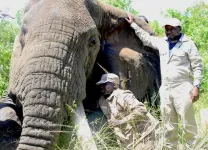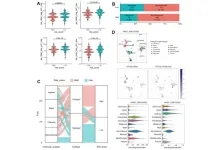Climate change threatens older elephants most, jeopardizing African elephants’ future
New study from UMass Amherst and Wildlife Conservation Society finds that continuing international cooperation, community involvement most important in ensuring elephants’ survival
2024-01-31
(Press-News.org) January 31, 2024
Climate Change Threatens Older Elephants Most, Jeopardizing African Elephants’ Future
New study from UMass Amherst and Wildlife Conservation Society finds that continuing international cooperation, community involvement most important in ensuring elephants’ survival
AMHERST, Mass. – A collaborative team of researchers from the University of Massachusetts Amherst and the Wildlife Conservation Society (WCS), which runs the world’s largest field conservation program, has conducted first-of-its kind research into how global climate change affects African elephants. The work, published recently in PLOS Sustainability and Transformation, shows that older elephants will have markedly decreased chances of survival, which will not only drastically reduce the species’ overall ability to weather the changing climate but will send ripple effects throughout the surrounding landscape. The team has also modelled possible mitigation scenarios, which WCS is already implementing.
Africa’s Greater Virunga Landscape (GVL) is a 15,700-square-kilometer area of savannas, mountains and lakes in Uganda, Rwanda and the Democratic Republic of Congo. It is home to the largest land animals in Africa, with seven national parks, three tropical high-forest reserves and three wildlife reserves, three of which are world heritage sites, covering 88% of the area. It is also home to a population of African elephants whose numbers have dropped so precipitously over the past century that they are now listed as critically endangered by the International Union for Conservation’s Red List.
Elephants play a key role in modifying and sustaining their landscapes by dispersing the seeds of the plants they feed upon, felling trees and enriching soil fertility with their dung. They also play an important role in many African cultures.
To date, few studies have focused on the dynamics of the environment, climate change, elephant demography and how the changing habitat influences elephants over long periods. To get a clearer picture of what the elephants’ future might look like and what we can do to best ensure their survival, lead author Simon Nampindo, who completed this research as part of his Ph.D. in environmental conservation for UMass Amherst and who is now country director for WCS Uganda, and Timothy Randhir, professor of environmental conservation at UMass Amherst, built a systems dynamic model. “This model,” says Nampindo, “can look at all the different environmental and population dynamics within a system. For the first time, we’re able to get a comprehensive vision of what the future might look like for African elephants in the face of climate change.”
Nampindo and Randhir built their model using data on the numbers of elephants, historical changes in the landscape and different future climate-change scenarios representing 1.6 º, 2.8º and 4.3º Celsius of warming over the next 80 years. Finally, they charted the effect each of the climate scenarios would have on five elephant age brackets: under 10 years old, 11 – 30, 31 – 40, 41 – 50, and more than 50 years old, because, as Randhir puts it “any impact on one age class has a community effect throughout the entire population.”
“We found that the older elephants will be massively affected by warming under every scenario,” says Nampindo. “Elephants are matriarchal—their leaders are the older cows, and the herds depend on their wisdom, long memories and ability to outsmart prey, and if they are lost to changing climate, it will wreak havoc on the surviving, younger herds, as well as change the genetic profiles and structures of the herd. There will also be ripple effects through the GVL’s landscape.”
“But,” says Randhir, “this model not only tells us what the threats are, we can also use it to tell us which policy possibilities will be most effective in helping African elephants to survive.”
In the case of a species like the elephant, which migrates widely across national boundaries, it is especially important to also understand how differing policies could affect future herds so that management agencies can coordinate their responses.
In particular, Nampindo and Randhir find that a coordinated GVL management strategy at the national, regional and local levels is needed to address poaching threats. Well-funded anti-poaching efforts are essential, but they also point to the importance of community-led programs and education in the front-line towns and villages where human-elephant interaction is common. The GVL landscape must also be managed appropriately to reduce the impact of habitat fragmentation, fire and invasive species.
“These results are very important to WCS,” says Nampindo. “If we can do a good job at protecting elephants, our efforts will reverberate to other species, such as lions and mountain gorillas.”
“More broadly,” says Randhir, “the most exciting thing about this systems dynamic modeling is that it can be adapted to any migratory species that move across political boundaries, from fish to birds to lions.”
A media kit, with photos, captions, credit info and a copy of the study is available here.
Contacts: Timothy Randhir (UMass Amherst), randhir@umass.edu
Daegan Miller (UMass Amherst), drmiller@umass.edu
Mary Dixon (WCS), mdixon@wcs.org
END
[Attachments] See images for this press release:

ELSE PRESS RELEASES FROM THIS DATE:
2024-01-31
“These findings provided evidence for the role of senescence in the tumor microenvironment [...]”
BUFFALO, NY- January 31, 2024 – A new research paper was published on the cover of Aging (listed by MEDLINE/PubMed as "Aging (Albany NY)" and "Aging-US" by Web of Science) Volume 16, Issue 2, entitled, “Prognostic significance of senescence-related tumor microenvironment genes in head and neck squamous cell carcinoma.”
The impact of the senescence related microenvironment on cancer prognosis and therapeutic response remains poorly understood. In this new study, researchers Young Chan Lee, Yonghyun Nam, Minjeong Kim, ...
2024-01-31
Andrew Muhammad, professor and Blasingame Chair of Excellence in Agricultural Policy at the University of Tennessee Institute of Agriculture, has been elected president of the Southern Agricultural Economics Association. The newly elected president will be recognized at the Association’s upcoming annual meeting in Atlanta, Georgia, from February 3-6.
“We are excited for Dr. Muhammad in this important leadership role,” says Bill Johnson, interim department head for UT’s Department of Agricultural and Resource Economics. “His previous experience with SAEA and his global perspective on agriculture ...
2024-01-31
Rates of kidney stones are on the rise in the United States and around the world. Type 2 diabetes is associated with increased risk of kidney stones, but some forms of treatment for this condition may also have the benefit of lowering risk of kidney stones. In a study led by investigators from Mass General Brigham, researchers found that there was an association between the use of sodium-glucose contratransporter 2 (SGLT2) inhibitors and a lower risk of developing kidney stones. Their findings are reported in JAMA Internal Medicine.
Researchers from Brigham and Women’s Hospital and Massachusetts ...
2024-01-31
DURHAM, N.C. – A black sedan cruises silently down a quiet suburban road, driver humming Christmas carols quietly while the car’s autopilot handles the driving. Suddenly, red flashing lights and audible warnings blare to life, snapping the driver from their peaceful reprieve. They look at the dashboard screen and see the outline of a car speeding toward them for a head-on collision, yet the headlights reveal nothing ahead through the windshield.
Despite the incongruity, the car’s autopilot grabs control and swerves into a ditch. Exasperated, the driver looks around the vicinity, ...
2024-01-31
Strong support for Ukraine means there is “little space” for European politicians to exploit pro-Russia foreign policy messages, a new study shows.
Researchers have found widespread backing for Ukraine across the continent, and for policies that help the nation, such as imposing sanctions on Russia.
But public opinion is more mixed on the approach NATO should take and whether Ukraine should become a member.
Experts found European nations can be classified into three distinct groups. Citizens ...
2024-01-31
You might think age-related dementia has been with us all along, stretching back to the ancient world.
But a new analysis of classical Greek and Roman medical texts suggests that severe memory loss — occurring at epidemic levels today — was extremely rare 2,000 to 2,500 years ago, in the time of Aristotle, Galen and Pliny the Elder.
The USC-led research, published in the Journal of Alzheimer’s Disease, bolsters the idea that Alzheimer’s disease and related dementias are diseases of modern environments and lifestyles, with sedentary behavior and exposure to air pollution largely to blame.
“The ancient Greeks had very, very few — but we found them ...
2024-01-31
Does the type of solution used by surgeons to disinfect skin before surgery impact the risk of surgical site infection? According to new research from an international trial jointly led by McMaster University and the University of Maryland School of Medicine – yes, it does.
Researchers of the PREPARE trial, which enrolled nearly 8,500 participants at 25 hospitals in Canada and the United States, found the use of iodine povacrylex in alcohol to disinfect a patient’s skin could prevent surgical site infection in thousands of patients undergoing surgery for a closed ...
2024-01-31
UNIVERSITY PARK, Pa. — Trees are struggling to sequester heat-trapping carbon dioxide (CO2) in warmer, drier climates, meaning that they may no longer serve as a solution for offsetting humanity’s carbon footprint as the planet continues to warm, according to a new study led by Penn State researchers.
“We found that trees in warmer, drier climates are essentially coughing instead of breathing,” said Max Lloyd assistant research professor of geosciences at Penn State and lead author on the study recently published in Proceedings of the National Academy of Sciences. “They are sending CO2 right back into the ...
2024-01-31
From the study:
This research examines the anti-aging potential of the flavonoid derivative of isoquercitrin known as enzymatically modified isoquercitrin (EMIQ).
A 28-day clinical trial with 30 volunteers aged 31–55 years highlighted EMIQ's effectiveness. Participants using EMIQ-containing Essence displayed reduced facial trans-epidermal water loss and skin roughness, alongside improved skin elasticity. This study emphasizes EMIQ's potential as an anti-photoaging ingredient in cosmetics, warranting further research. The findings pave the way for developing innovative skincare products addressing photoaging effects. ...
2024-01-31
Ketamine has received a lot of attention as a potential treatment for depression, but few studies have revealed how well it works in real world settings, especially in patients with complex mental health needs.
Now, a new study of data from veterans who had tried many depression treatments but still had severe symptoms suggests a series of intravenous doses of ketamine gave many at least partial relief. For a minority, it led to full remission.
Nearly half of 215 veterans with treatment resistant depression who received ...
LAST 30 PRESS RELEASES:
[Press-News.org] Climate change threatens older elephants most, jeopardizing African elephants’ future
New study from UMass Amherst and Wildlife Conservation Society finds that continuing international cooperation, community involvement most important in ensuring elephants’ survival




